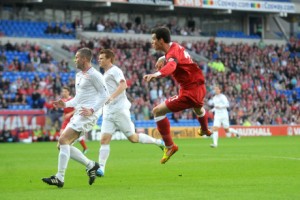 after watching the first twenty minutes of our our 4-1 demolition job on Norway (ranked twenty fourth in the world) yesterday, surely “it’s just like watching Wales” is more appropriate? In saying that, when the second goal went in, I couldn’t help mentioning the similarity between the Norway performance up to then and the one they gave in Wrexham in 2008 when they subsided meekly to a 3-0 defeat against a Jason Koumas inspired home side. Excellent as Wales were in those opening stages yesterday, it was hard to forget Brede Hangeland’s pre match comments about the Norwegian team finding it hard to get motivated for a friendly in Wales so soon after missing out on a Play Off spot for Euro 2012 on goal difference – were Wales just taking advantage of a disinterested opposition who were making them look good?
after watching the first twenty minutes of our our 4-1 demolition job on Norway (ranked twenty fourth in the world) yesterday, surely “it’s just like watching Wales” is more appropriate? In saying that, when the second goal went in, I couldn’t help mentioning the similarity between the Norway performance up to then and the one they gave in Wrexham in 2008 when they subsided meekly to a 3-0 defeat against a Jason Koumas inspired home side. Excellent as Wales were in those opening stages yesterday, it was hard to forget Brede Hangeland’s pre match comments about the Norwegian team finding it hard to get motivated for a friendly in Wales so soon after missing out on a Play Off spot for Euro 2012 on goal difference – were Wales just taking advantage of a disinterested opposition who were making them look good?
Being fair, the answer to the question probably has to be “yes”, but only to a degree, because what happened after those first twenty minutes reflected well on both sides while also suggesting that Wales are becoming a side to be feared on the international stage. If Norway would rather have been somewhere else in those opening stages, the feeling did not last long once they had gone 2-0 down as they paid Wales the complement of going like for like with them by switching to 4-5-1 and then began to work their way back into the game. For three quarters of the match, there could be no doubts about Norway’s level of commitment – they were hard working, passed the ball neatly at times and had more than their fair share of possession as they pressed Wales back.
However, apart from a fine shot against the post by Mohammed Abdellaoue and one other incident, they caused Wales few problems in the first half and that one incident I mentioned offered a telling illustration into the contrast between the dilligent, but fairly predictable, Norwegian team and their vibrant and confident opponents. Norway were able to break from a Welsh corner and a fairly lucky bounce of the ball saw Portsmouth’s Erik Huseklepp presented with a clear run in on goal from the half way line – for a while it looked certain that the visitors would pull a goal back, but Adam Matthews showed not only the pace to catch his opponent very quickly, but then also the technique to win the ball cleanly when he knew that any mistiming of the challenge on his part would lead to an inevitable red card.

Okay, the keeper should have done better, but Gareth Bale's viscous volley for the first Welsh goal was an example of a confident player succeeding because he was good enough to to do something difficult and unexpected.*
Technique allied with pace, that’s what Matthews showed in that incident and that is what Wales had that their opponent’s didn’t. The technique was there for the Norwegians, but they were never able to show it while travelling at the same types of speed as some of the Welsh players did – for much of the time from the twenty minutes mark onwards, Norway were the team who had more possession, but, for the most part, they did not have the pace to seriously inconvenience Wales. There were a few wobbles from the home side after Wayne Hennessey’s awful mistake (with his poor showing at Man City recently, it’s not been a good fortnight for the usually reliable Wolves keeper) gifted Huseklepp a goal and Morten Gamst Pedersen hit the frame which keeps the net in place with a shot that looked to have beaten Hennessey.
With Norway chasing the equaliser though, there was always the chance that Wales could hit them on the counter and when they did, it was that combination of pace and technique that did for the visitors. Bale’s flick to Bellamy to start the move which led to the third goal was a lovely bit of skill, but from then on, the move looked fairly simple as the two players combined to leave sub Sam Vokes with the easy task of tapping in Bale’s cross. The thing is though that all of this was done while travelling at speeds most footballers cannot reach – Bellamy and Bale were able to deliver the perfect passes in circumstances that fully tested their techniques and Norway never had anyone capable of moving quickly enough to see if their technique was up to those sort of tasks.

The excellent Craig Bellamy is congratulated after his goal by Adam Matthews whose fine all round display left me with very mixed feelings - Dave Jones has a lot to answer for as far as this player is concerned.*
Vokes’ second goal a minute later was a reminder that Wales now have a depth to their squad that hasn’t been there in recent years. While the goal didn’t involve the pace I talked about, it did show a good technique in action and this is something that now runs throughout the side. Although his standards slipped a little following his error, Hennessey is one of the best kickers of a ball around amongst modern keepers. the defenders are all pretty comfortable in possession (watching Darcy Blake yesterday, all I can say is City must have some team if he cannot get in it), we have a midfield capable of not only keeping the ball, but also passing it with a quality that causes opponent’s real problems and have a target man who is hardly a spectacular player, but his part in Bale’s goal shows that he shouldn’t be underestimated with the ball at his feet.
It’s becoming the norm lately in these posts on Wales games for me to give credit to a manager who I must admit to having real doubts about until fairly recently. With the score at 2-1 and Wales looking a bit nervous, Gary Speed sent on Hal Robson-Kanu. When I saw the Reading player about to come on, I assumed it was going to be for Bellamy or Bale, but instead he went for Joe Allen (who played well enough, but, given all the fuss about his recent Swansea performances, I did expect a bit more from him). This seemed a very strange move to me as Aaron Ramsey dropped back and Bellamy switched to a more central role behind the lone striker, but it has to be said that the substitution worked a treat. As expected, Ramsey fitted in to his new role with no problems, while Robson-Kanu gave Wales even more pace on the break – it was an attacking substitution at a time when it must have been tempting to shore things up and all credit to Gary Speed for that.
Finally, Speed will be taking part in meetings to sort out the itinerary for Wales qualifying group for the 2014 World Cup and, as sixth seeds in a group of six, I doubt it if we will get our own way too often, but, such is the ability and confidence being shown by the team at the moment, it’s tempting to say let the other five teams do their worst as far as our schedule is concerned. Despite what I said about our improved squad depth earlier, the fact has to be faced that there are two or three players who we could not replace adequately if they weren’t available for any reason and, because of this, I’m reluctant to predict that we can finish in the top two of our group, but I can certainly see us having a big influence on who eventually makes it through – we are capable of beating anyone in the group on our day.
* pictures from http://www.walesonline.co.uk/


